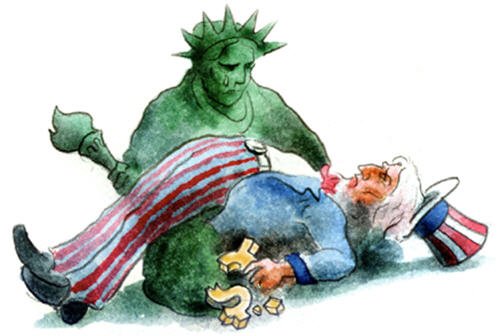
Quoted before in this column was President John F. Kennedy’s dark joke that the only thing worse than being an enemy of the United States was being an ally. In the shadow of the NATO heads of state summit that concluded last weekend in Lisbon, Portugal, Kennedy’s remark was turned on its head.
The only thing worse for NATO than enemies were friends and allies. President Hamid Karzai of Afghanistan and the U.S. Congress represented by the Senate were cases in point.
The summit had four major goals. First was to approve a new Strategic Concept to replace the one ratified in 1999. Second was to agree on Afghan strategy. Third was to solidify the alliance’s position on missile defense. And fourth was to improve relations with Russia.
The new Strategic Concept as well as missile defense including Russian participation was indeed approved. The document wisely recognized the needs of the 21st century by broadening NATO from a purely military to a political-military alliance.
However, it lacked convincing punch in explaining to its publics why NATO is still relevant today and not a relic of the past. By listing so many notable aims and good intentions without prioritizing them the new concept circumvented the minefields sown by the many diverging political and strategic objectives among NATO’s 28 members. But until a viable action plan is drawn up and actually implemented, the jury will be out on the long-term impact of the concept.
The alliance further agreed to turn over all security responsibilities to Afghan forces by the end of 2014. Politically, especially for member states whose publics are opposed to the Afghan adventure, this is a light at the end of the tunnel. Yet, the promise to engage the alliance in Afghanistan for at least four more years, doesn’t guarantee reversing failing public support for the mission.
Before the summit, Karzai was unhelpful in the extreme. An interview in The Washington Post early last week followed by another in the Financial Times was explosive. Karzai railed against the United States and NATO for killing civilians and dark of night arrests and take downs of alleged Taliban. In the FT, Ahmed Rashid, a well known Pakistani journalist wrote that Karzai’s “new world view (anti-U.S. and NATO) was the most dramatic political shift … in the 26 years that I have known him.”
Karzai more or less drifted back onto the reservation in Lisbon. However, as a senior Western diplomat once observed about Karzai’s behavior, one wonders if he was “off his meds” or indeed was reflecting his true beliefs in the interviews. If the latter is correct, how can NATO succeed in Afghanistan?
Now, the political firefight in the Senate over the new strategic arms treaty with Russia captures our attention. A little history: for all the mythology of leaving politics at “the water’s edge,” Congress has a sometimes feckless history regarding foreign policy.
A Republican Senate rejected Democratic President Woodrow Wilson’s Versailles treaty ending World War I in part because of how the president ignored that body during the peace conference deliberations.
Before Pearl Harbor, Congress was largely isolationist and opposed President Franklin Roosevelt’s efforts to engage the nation in World War II.
That legacy of fecklessness was accelerated by the Vietnam War and Watergate. Since then, the political atmosphere in Washington has become radioactively partisan. Both parties share responsibility and culpability. Consider the last 20 years.
Democrats were out to obstruct if not defeat the presidencies of George H.W. and George W. Bush. Republicans sought to bring down President Bill Clinton, impeached but not convicted. Now, Barack Obama is in Republican sights. Senate Minority Leader Mitch McConnell, R-Ky., brags that his top priority is making Obama a one-term president clearly ignoring his sworn first duty to defend the Constitution.
The weapon of choice is ratification of New START with Russia. In the Senate for months, Republicans are now insisting that the agreements on missile defense and assuring the reliability of nuclear weapons are flawed. But the driving forces are political. In such a poisonous environment, the nation’s security as well as NATO’s are in jeopardy in the START debate and when or if the treaty is approved.
From an objective perspective, the treaty is unexceptional advancing the interests of Russia and America. That so many senior U.S. military officers, former officials and NATO allies agree is very convincing. Critics cite distant fears over gaps in weapons reliability and missile defense. That NATO’s new Strategic Concept recognizes the need for nuclear weapons and missile defenses is a powerful antidote against these fears.
Kennedy may be proven correct again. Friends can be more dangerous than enemies. Worse, many will ask, why trust America?
Years ago, Walt Kelley’s iconic Pogo cartoon immortalized our politics: “We have met the enemy. It is us.” Amen!
Harlan Ullman is Senior Advisor at the Atlantic Council, Chairman of the Killowen Group that advises leaders of government and business, and a frequent advisor to NATO. This article was syndicated by UPI.
Image: uncle-sam-statue-liberty-500_0.jpg
